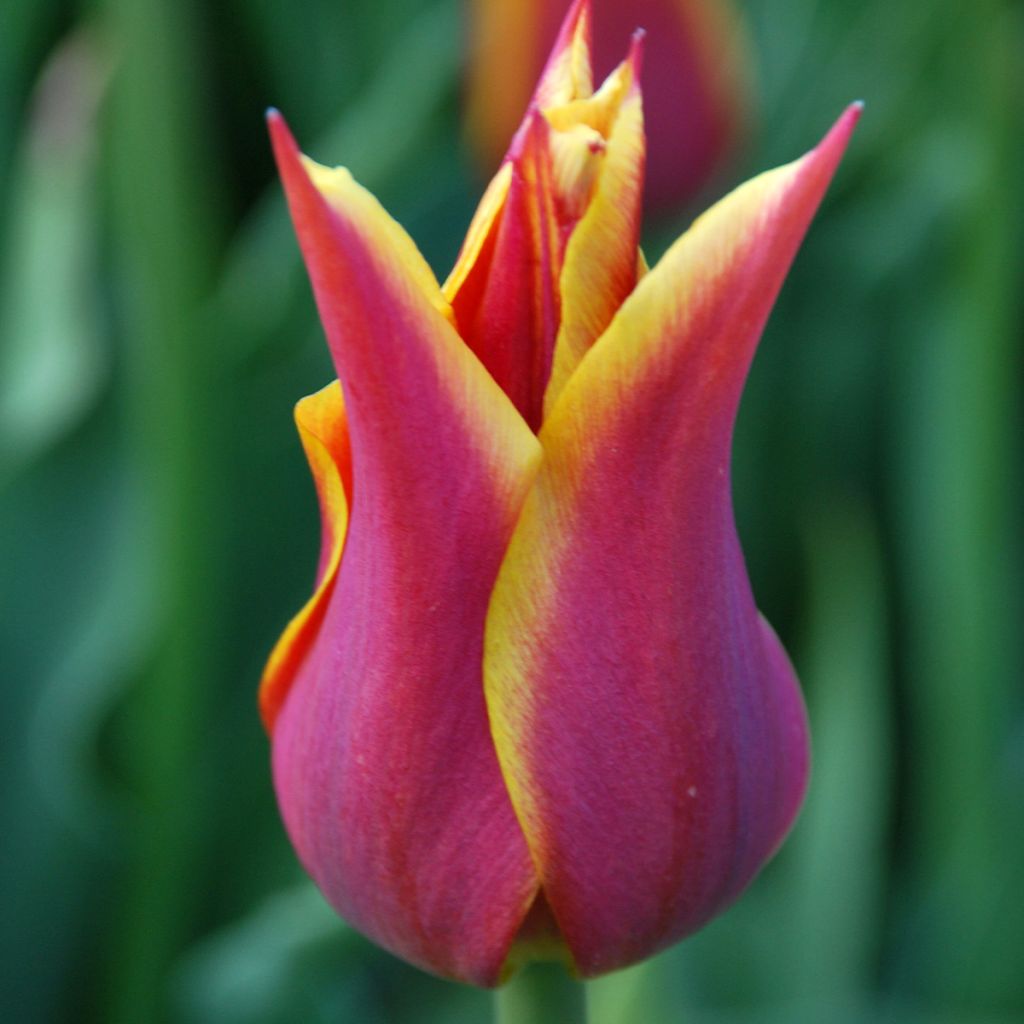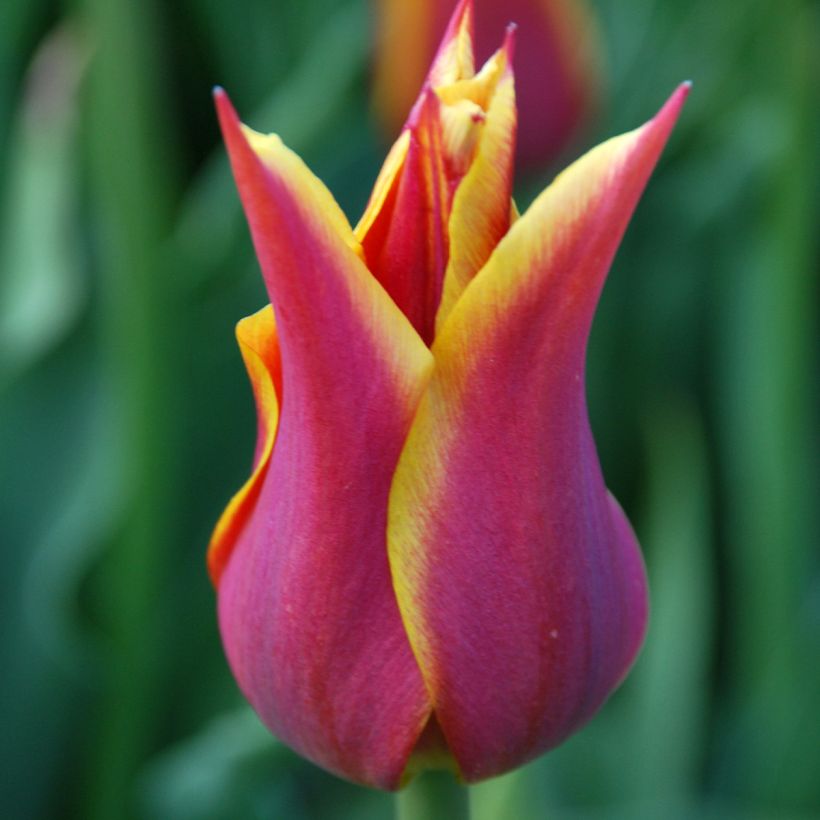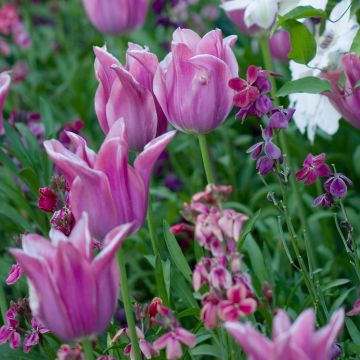

Tulipe fleur de lis Sonnet
Tulipa Sonnet - Lily flowering Tulip
Tulipa Sonnet
Tulip
Special offer!
Receive a €20 voucher for any order over €90 (excluding delivery costs, credit notes, and plastic-free options)!
1- Add your favorite plants to your cart.
2- Once you have reached €90, confirm your order (you can even choose the delivery date!).
3- As soon as your order is shipped, you will receive an email containing your voucher code, valid for 3 months (90 days).
Your voucher is unique and can only be used once, for any order with a minimum value of €20, excluding delivery costs.
Can be combined with other current offers, non-divisible and non-refundable.
Why not try an alternative variety in stock?
View all →This plant carries a 6 months recovery warranty
More information
We guarantee the quality of our plants for a full growing cycle, and will replace at our expense any plant that fails to recover under normal climatic and planting conditions.

Would this plant suit my garden?
Set up your Plantfit profile →
Description
The 'Sonnet' Tulip is a variety of tulip with extraordinary lily-shaped flowers that attracts all the attention in the garden, both for the shape of its Medicis vase flower and its quite fantastic bicolour expression. Very long-lasting as a cut flower, carried by a thin but sturdy stem, it is also a fabulous cut flower. The lily-shaped tulips bloom late, but faithfully return year after year without degenerating.
Lily-shaped tulips were created in the early 20th century, they have preserved the robustness and simplicity of their ancestor, the magnificent Tulipa acuminata. This botanical species, native to Turkey, became extinct in the wild, but survived, in its red and yellow form, among English and Dutch enthusiasts. On the frescoes and ceramics of the Topkapi Palace in Istanbul, all kinds of acuminated tulips can be found, already adored at the time by the sultans. The flower, depending on whether it is open or closed, undergoes a surprising metamorphosis, changing from a spider to a lily-shaped flower in the space of a day.
The 'Sonnet' lily-flowered tulip, introduced to the Netherlands in 1994, belongs, like all tulips, to the lily family. It is classified in division 6 of horticultural tulips, the main characteristics of this category are as follows: they bear single flowers and bloom in the second half of spring, the cups are narrow and curved, the pointed tepals are recurved at the opening and open in a star shape. During the day, these flowers become spider-like and widely open. This 'Sonnet' variety reaches approximately 50cm (20in) in height when in bloom. Its thick-textured flower opens in brick red with violet reflections and highly contrasting golden yellow edges. The colour of the petals gradually evolves, but in a spectacular way, into a brilliant raspberry-plum colour bordered with caramel apricot. The flowering takes place at the end of April or beginning of May. The foliage is thinner than that of other tulips. Each solitary flower is supported by a seemingly delicate but weather-resistant stem.
The 'Sonnet' lily-shaped tulip shines in large beds, planted in small groups with white varieties ('Sapporo'), green varieties ('Virichic'), or in orange tones. Since its flowering is quite late, it allows for maximum blooming time in the beds. Pair it with wood hyacinths (Scilla nutans) or with Siberian squills to create a colourful scene. Or with lady's mantle, Corsican hellebores, and Euphorbias, you will also obtain surprising scenes. It can also be planted in pots and containers to embellish balconies and terraces. It is ideal for creating bold and creative bouquets.
When using as a cut flower, use very little water, just a bottom is enough! Furthermore, if your tulips open too quickly, you can add two to three ice cubes to the vase every day. Many varieties of lily-flowered tulips are grown for forcing and produce cut flowers for a large part of the year.
Report an error about the product description
Tulipa Sonnet - Lily flowering Tulip in pictures


Plant habit
Flowering
Foliage
Botanical data
Tulipa
Sonnet
Liliaceae
Tulip
Cultivar or hybrid
Planting and care
Plant the bulbs in autumn, from September to December, at a depth of 15cm (6in), spacing them 10cm (4in) apart. The planting should be done in ordinary soil, slightly acidic, neutral, or slightly alkaline, loose, well-worked, and well-draining. Never add manure or poorly decomposed compost to the planting soil, as this could cause the bulbs to rot. The 'Sonnet' tulip will grow well in moist to dry soil in summer. Place it in a good exposure, sunny or partly shaded. Once the flowering is over, it is advisable to remove the fruits to avoid exhausting the plant.
Planting period
Intended location
Care
This item has not been reviewed yet - be the first to leave a review about it.
Haven't found what you were looking for?
Hardiness is the lowest winter temperature a plant can endure without suffering serious damage or even dying. However, hardiness is affected by location (a sheltered area, such as a patio), protection (winter cover) and soil type (hardiness is improved by well-drained soil).

Photo Sharing Terms & Conditions
In order to encourage gardeners to interact and share their experiences, Promesse de fleurs offers various media enabling content to be uploaded onto its Site - in particular via the ‘Photo sharing’ module.
The User agrees to refrain from:
- Posting any content that is illegal, prejudicial, insulting, racist, inciteful to hatred, revisionist, contrary to public decency, that infringes on privacy or on the privacy rights of third parties, in particular the publicity rights of persons and goods, intellectual property rights, or the right to privacy.
- Submitting content on behalf of a third party;
- Impersonate the identity of a third party and/or publish any personal information about a third party;
In general, the User undertakes to refrain from any unethical behaviour.
All Content (in particular text, comments, files, images, photos, videos, creative works, etc.), which may be subject to property or intellectual property rights, image or other private rights, shall remain the property of the User, subject to the limited rights granted by the terms of the licence granted by Promesse de fleurs as stated below. Users are at liberty to publish or not to publish such Content on the Site, notably via the ‘Photo Sharing’ facility, and accept that this Content shall be made public and freely accessible, notably on the Internet.
Users further acknowledge, undertake to have ,and guarantee that they hold all necessary rights and permissions to publish such material on the Site, in particular with regard to the legislation in force pertaining to any privacy, property, intellectual property, image, or contractual rights, or rights of any other nature. By publishing such Content on the Site, Users acknowledge accepting full liability as publishers of the Content within the meaning of the law, and grant Promesse de fleurs, free of charge, an inclusive, worldwide licence for the said Content for the entire duration of its publication, including all reproduction, representation, up/downloading, displaying, performing, transmission, and storage rights.
Users also grant permission for their name to be linked to the Content and accept that this link may not always be made available.
By engaging in posting material, Users consent to their Content becoming automatically accessible on the Internet, in particular on other sites and/or blogs and/or web pages of the Promesse de fleurs site, including in particular social pages and the Promesse de fleurs catalogue.
Users may secure the removal of entrusted content free of charge by issuing a simple request via our contact form.
The flowering period indicated on our website applies to countries and regions located in USDA zone 8 (France, the United Kingdom, Ireland, the Netherlands, etc.)
It will vary according to where you live:
- In zones 9 to 10 (Italy, Spain, Greece, etc.), flowering will occur about 2 to 4 weeks earlier.
- In zones 6 to 7 (Germany, Poland, Slovenia, and lower mountainous regions), flowering will be delayed by 2 to 3 weeks.
- In zone 5 (Central Europe, Scandinavia), blooming will be delayed by 3 to 5 weeks.
In temperate climates, pruning of spring-flowering shrubs (forsythia, spireas, etc.) should be done just after flowering.
Pruning of summer-flowering shrubs (Indian Lilac, Perovskia, etc.) can be done in winter or spring.
In cold regions as well as with frost-sensitive plants, avoid pruning too early when severe frosts may still occur.
The planting period indicated on our website applies to countries and regions located in USDA zone 8 (France, United Kingdom, Ireland, Netherlands).
It will vary according to where you live:
- In Mediterranean zones (Marseille, Madrid, Milan, etc.), autumn and winter are the best planting periods.
- In continental zones (Strasbourg, Munich, Vienna, etc.), delay planting by 2 to 3 weeks in spring and bring it forward by 2 to 4 weeks in autumn.
- In mountainous regions (the Alps, Pyrenees, Carpathians, etc.), it is best to plant in late spring (May-June) or late summer (August-September).
The harvesting period indicated on our website applies to countries and regions in USDA zone 8 (France, England, Ireland, the Netherlands).
In colder areas (Scandinavia, Poland, Austria...) fruit and vegetable harvests are likely to be delayed by 3-4 weeks.
In warmer areas (Italy, Spain, Greece, etc.), harvesting will probably take place earlier, depending on weather conditions.
The sowing periods indicated on our website apply to countries and regions within USDA Zone 8 (France, UK, Ireland, Netherlands).
In colder areas (Scandinavia, Poland, Austria...), delay any outdoor sowing by 3-4 weeks, or sow under glass.
In warmer climes (Italy, Spain, Greece, etc.), bring outdoor sowing forward by a few weeks.






























